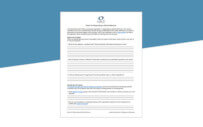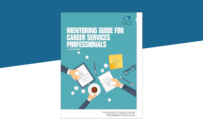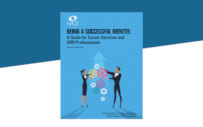
Research findings underscore the need for organizations to invest in enhancing recruitment and retention strategies for Latinas in senior executive roles.

The University of Texas at Austin (UT Austin) is a public Research 1 university with 52,000 students and 18 colleges and schools, including medical and law schools. Like many large universities, UT Austin has a highly distributed model of 15 career centers within schools, and each area operates independently.

Clarion University was part of a historic integration within the Pennsylvania State System of Higher Education (PASSHE). Since 2020, Clarion, California, and Edinboro Universities of Pennsylvania have worked to plan and execute the integration of their three unique, standalone universities to one shared model. As of July 1, 2022, we became Pennsylvania Western University (PennWest).

NACE’s research shows that career services has a quantifiable effect on students and their entry into the world of work. It’s hardly a new question: Over the years, many career services professionals have been asked to respond, often when budgets are tight and administrators are looking for where to make cuts, but even when that’s not the case.

During the pandemic in 2020, LaGuardia Community College—a public community college that is part of the City University of New York (CUNY) system—inaugurated a new president, who is an advocate for workforce development as well as for internships. In addition, the chancellor for CUNY established career services as one of his priorities.

A grant from the United Negro College Fund (UNCF) helped to move career services to a position of more prominence at Tougaloo College and embed career readiness in the school’s curriculum.

Career services at Michigan State University (MSU) is a centralized/hybrid organization of offices and is well-known for its Career Services Network, which is composed of career services professionals strategically located in central and college-based offices.

William & Mary (W&M) has recently undergone a shift that has elevated career services, alumni engagement, internships, and applied learning at the highly selective, Research 2, public, residential research university.

Soon after Mark Peltz was hired as the associate dean and director of career development at Grinnell College, it began a process of institutional elevation and prioritization of career services.

It seems like you don’t have to look far to find criticism regarding the value of a college degree. In fact, some critics (and graduates who are riddled with heavy student loan debt) are recommending a harkening back to vocationally focused education

There are two types of people in the world of career services: people who know about JLD and those who have not heard about it yet. It is a tad obscure and vague; however, it can have a significant impact on a student’s educational journey and pathway to career success.

Online education, as we think of it today, emerged more than 20 years ago as the growing internet gave rise to a new way to deliver learning: distance learning. As the tools for distance learning have become more prevalent and, more importantly, interactive, access to education has expanded.

Over the past 10 years, there has been a clear shift away from housing the career center in student affairs.

A senior university official requires the career center to bar a specific employer from on-campus recruiting events due to possible protests.

The “wandering map,” a variation on the mind map, encourages students to explore their lives on paper.

The coaching movement addresses the student as an equal partner, empowering them to close the gap between where they are and where they want to be.

The rubric models the Principles Committee’s process in addressing requests for advisory opinions and can help career services and recruiting professionals address ethical dilemmas.

Five years ago, Rutgers University – New Brunswick adopted the career cluster model. How is it working? How has it evolved?

At the University of Nevada, Reno the career center became the Career Studio, where students never need an appointment. All career advising is done by undergraduate students; the professional team focuses on all other aspects of career development.

Richmond merged career services and alumni services to elevate career services, provide additional resources for students, and more deeply engage alumni.

Coaching is the primary focus regarding the career development of students and the professional development among career services staff.

Career centers play a critical role in supporting diversity, equity, and inclusion.

Get answers to frequently asked questions about the revised NACE Principles.

NACE’s Principles provide everyone involved in the career development and employment process with an enduring ethical framework on which to base their operations and interactions.

At Princeton University, career services is reimagined along the themes of purpose and meaningful work.

Assistant and associate directors have one foot in vision and strategy and the other in day-to-day operations. How do these professionals excel as middle managers?

The Mentoring Guide for Career Services, by Gary Alan Miller, can help career services professionals onboard and mentor professionals new to the office.

The guide provides faculty with information about the ethical and legal implications associated with referring students for internship and employment opportunities.

This case study by the NACE Principles for Ethical Professional Practice Committee addresses the ethical issues involved when faculty refer and rank students for employers and offers recommendations for how career center staff can resolve the issues.

Job Descriptions

Employer Relations Job Descriptions

Assistant Director Job Descriptions

Job Descriptions - Miscellaneous

Career Services Director Job Descriptions

Internship/Cooperative Education Job Descriptions

Associate Director Job Descriptions

Sample Recruiting Policies - Career Services

Sample Reciprocity Resources - Career Services

Sample Letter #6: Letters of Reciprocity

Sample Letter #5: Letters of Reciprocity

Sample Letter #4: Letters of Reciprocity

Sample Letter #3: Letters of Reciprocity

Sample Letter #2: Letters of Reciprocity

Sample Letter #1: Letters of Reciprocity

Policy on Reciprocity.

The mission of the Engineering Career Services (ECS) office at (redacted) is to link engineering students who seek pre- and post- graduate career opportunities with employers who wish to hire them. ECS does not provide resumes, access to student candidate information, or access to our on-line job listing service to third parties; nor are third parties permitted to attend career fairs or schedule interviews on campus.

Sample Hold Harmless Agreement, courtesy of Florida State University.

Engineering Career Services (ECS) adheres to the NACE Principles for Professional Conduct for Career Services and Employment Professionals and expects employers to do the same. These principles are available on the National Association of Colleges and Employers web site.

Sample Faculty Reference Letter Dear [Name of Employer]: This reference letter is provided at the written request of [name of student], who has asked me to serve as a reference on [his/her] behalf. It is my understanding that [name of student] is being considered by your organization for the position of [job title].

Appreciative inquiry is a positive, solution-focused approach to problem solving and is sometimes labeled appreciative coaching, appreciative advising, and appreciative living. These labels tend to reflect the population served: Appreciative inquiry focuses primarily on organizations, while the other terms apply more to work with individuals.

The U.S. Department of Labor allocates billions of dollars annually to support education and career development activities. Federally financed career development services is guaranteed and ongoing funding mandated by WIOA is potentially available to all college and university career centers. This article explores how Ohlone College’s career center tapped federal funds to help finance career services for its students.

Using before and after assessments, career coaches at the University of Cincinnati analyze the outcomes of their course for undergraduate business students and identify future directions based on the data.

By encouraging students to engage in real-world problems using the Challenge Method, career professionals can help students take tangible steps toward career decision-making and planning.

Some universities and colleges require third-party recruiters to reveal the name of the organization they are recruiting for.

Fatim Lelenta, NYU, discusses strategies for supporting the personal and professional development of counselors-in-training.

A career center compiles first-destination survey data; other offices on campus want access to the raw data.

Career centers and students must be vigilant about fraudulent employers and should identify steps to take to verify the legitimacy of an employer.

This advisory opinion from the NACE Principles Committee addresses concerns many career centers have in working with international students who are limited by work authorization restrictions.

Use the index to find case studies and advisory opinions related to specific NACE principles, and to match up NACE principles to ethics-related resources.

Being a Successful Mentee,” by Diane Safer, Yeshiva College, provides guidance on how to get the most out of relationships with mentors.

This advisory opinion, developed by the NACE Principles for Ethical Professional Practice Committee, offers guidance on working with technology service providers in managing data security.

There are benefits to engaging with a mentor with whom you do not share an identity.

Philip Wilkerson, III and Samara Reynolds, authors of “The Value of Intentional Cross-Identity Mentorship,” share their personal insights about mentorship.

By intentionally blending appreciative advising and brain-based career development, career services professionals can better serve students.

Solo or small-staff career services offices can take steps to sustain a satisfactory level of career services and, in some cases, grow their operations.

Employers should not require a candidate’s social media account logins or passwords; it violates NACE’s ethical principles.

This case study illustrates issues that career centers and employers face in providing students with equitable access to services and opportunities.

After accepting a job offer, a female student of color learns the company has a poor reputation with women and Hispanics; she reneges on her acceptance and accepts a offer from another firm. How does the career center address the ethical issues and the employer’s concerns about the student reneging?

A student accepts a job offer and withdraws their candidacy from other companies; the employer rescinds the job offer a month before the job’s planned start date, leaving the student with no job and no on-campus access to other employers. What are the ethical issues involved? What can the career center, student, and employer do?

In this advisory opinion, the National Association of Colleges and Employers explains that career centers should not select students for employers to interview for jobs or internships and reviews the ethical underpinnings of that opinion.

The following case study discusses ethical considerations when a career center seeks to attract students from diverse social identities to engage with their career center, access website content, and engage with other service delivery platforms.

This case study discusses ethical considerations when an employer seeks to connect with specific student populations through the career center in order to enhance diversity recruitment efforts.

A student’s identifiable demographics are sent via email by career center staff and shared with others outside of the university. Besides the legal implications, such a scenario has ethical implications, which are addressed by the NACE Principles for Ethical Professional Practice.

Rescinding a job offer or acceptance is unfortunate and should only happen in rare instances. This advisory from the NACE Principles Committee considers the relevant ethical issues.

By supporting appropriate recruitment and employment practices, career services can play a key role in ensuring positive connections between employers and students. Career centers should develop policies that govern an employer’s access to their institution’s students for employment recruitment purposes.

The timing of job offers and acceptances is market-driven. NACE encourages employers to set reasonable deadlines that work for their organizations and students.